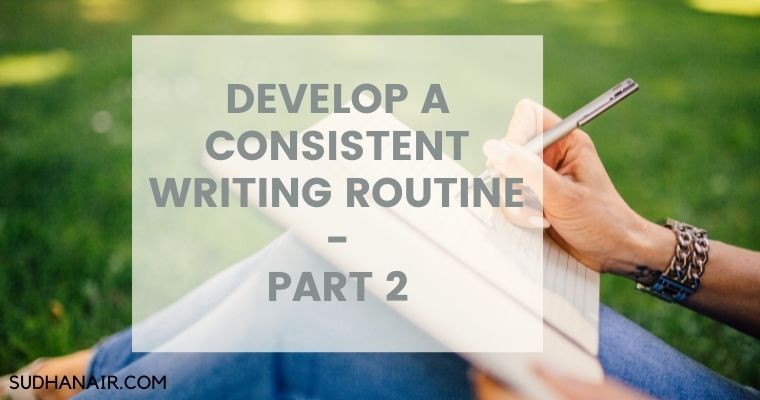A consistent writing routine may take some time and patience to develop but once you have a system that works for you, you’ll see that it requires very little effort to sustain.
This is Part 2 of the daily writing practice series.
We all have good writing days and bad writing days but what you’re about to discover is that the better equipped you are at handling whatever kind of writing day you’re having, the better you become at converting any day into a productive writing day.
To develop a consistent writing routine, there are a few things you need to be aware of, a few best practices to be kept in mind, and the determination to make the best of what you have.
A so-so writing day can become a good writing day with very few changes in your lifestyle and the way you approach your day.
That’s what we’re here to talk about.
In Part 1, we talked about finding a personal word count target.
If you haven’t read that yet, please read it and come back. It’s very important to determine your personal word target first.
While having a daily word count target is all well and good, how do you stop procrastinating?
How do you ensure that you sit to write in the first place and get to finish your goals in the stipulated time that you have every day?
Read on to find out.

How to develop a consistent writing routine – Part 2
This post contains links to the Amazon affiliate program. As an Amazon Associate, I earn from qualifying purchases.
Make time for writing every day
First and foremost, it’s important to set aside a writing time every day.
Apart from the word count, this is the second-most important decision a writer will ever make.
How does a set writing time help?
Imagine if you postponed writing to the end of the day when you’d finished all the work around the home or office. Then, you got tired by the end of the day and decided to put off writing. And then, you repeated that on a loop every single day.
Guess what would happen?
You’d never get any writing done!
How about making writing as important as brushing your teeth, or exercising, or taking a shower every day?
How about scheduling a time in a day when you know you will have some time to set aside just for writing?
Some writers are early birds and finish their writing first thing in the morning before their family wakes up. Other writers are night owls. Whatever time works best for you is your ideal writing time.
Remember, the more you put off writing well before the day draws to a close, the less likely you are to get to it at all.
Author James Scott Bell wrote 350 words every day first thing as soon as he woke up so that he had a good head-start on his daily quota very early in the day. Isn’t that a great way to kickstart your day?
While it’s great to have time set aside for writing, what if you’re editing the previous day’s work or an hour goes by as you select a song playlist or browse the internet to find a synonym for the word “walk” that’s not really a walk but more like an amble?
You get the point.
Writing time is sacred time.
It is meant to be free of distractions, going over previous work, mulling over a plot twist, or daydreaming.
So, how do you use this time wisely?
Here’s where the next step of my process comes in handy.
Time your writing session
Use a timer.
A timer is a powerful tool, even if you don’t believe it to be true, to get you moving as fast as possible. Like the ticking clock.
Heard of the story of the mother who got her child to practice math for 5 minutes every day by keeping a timer, and slowly, increasing the timer by a few minutes every day, until her child was able to sit for an hour without realizing it.
The timer is your friend for a consistent writing routine.
It creates a sense of urgency and goads you to finish the task you have undertaken.
If you’ve given yourself an hour every day to write, and 500 words to write in that hour, a ticking timer can be your best friend. It empowers you to make the most of your time.
The Pomodoro Technique for writing practice
The Pomodoro technique of time management uses the timer for alternating work times and break times to maximize focus and productivity.
In the Pomodoro technique, you set the timer to alternate between 25 minutes of work, and 5 minutes of break after that.
A block of four Pomodoros gives you 2 hours of work time. For every 25 minutes of put-your-head-down work, you get 5 minutes to get up, stretch, get a glass of water, and maybe just gaze at the sky for a few moments, before you get back to work.
While breaks may not seem important but rather counter-intuitive to getting more writing done, the opposite is actually true.
A break refreshes the brain and gives you a physical break from the monotony of typing. It also helps prevent injuries to your wrists, neck, and back, and so must never be ignored.
Take breaks in your writing.
Let’s discuss another important question that I’ve seen a lot of writers have.
How much time to allocate to your writing practice?
Time allocation.
Some of you may have a big chunk of time that you can set aside. Some of you may have only small chunks.
To use the chunk that you have to the fullest advantage, learn how to manage those chunks effectively.
I like bigger chunks of time. An hour at least.
It is important to give it time to get into the writing headspace.
Too short a writing time may feel like a total waste of energy.
Because it takes the body and the brain a few minutes to get into any activity or task to be able to get into a flow to produce work effectively.
Stop multitasking during your writing practice
Productivity and time management expert, Cal Newport, talks of engaging in singular tasks mindfully and avoiding multitasking. Switching tasks too often is known to kill productivity. That is why interruptions are also a no-no.
When you switch from your email to your writing, then to internet browsing, you are effectively cutting off the brain from focussing on a particular task to provide the maximum output.
It’s a good practice to log off from all social media, emails, and the internet during your writing time.
Allow the brain to focus on the task at hand.
Any research or words that need to be found on the internet can be done later. Keep a placeholder to identify the things you’ll need to find out after your writing time is up. For now, just drop an “x” to remind you that you will dig up that missing information later.
It would also be prudent to avoid surfing or bingeing on social media before your writing for the day is finished.
I can’t emphasize this enough.
There’s something about the wiring in our brain that makes external news warp the images and ideas that we’ve built inside our brains.
It interferes with getting into your writing day with the fresh energy and focus that we’ve reserved for it that day.
So, make writing a priority over social media, news, and emails.
Block your writing time
The last important point I want to make about writing time is to keep it the same time every day.
Your writing time is a personal time that must be calendar-blocked or scheduled.
It has to be a routine you adhere to every day.
If you have a calendar, mark your writing days with X-es and try not to leave more than one empty block between two X-es.
The caveat is when you have days when there are emergencies, you’re traveling, or have guests. Then, of course, that time cannot hold.
Don’t punish yourself for not holding to your time. Remember to push on at a later time, or get back to your routine tomorrow, or at the earliest possible time.
Never fret over lost time. Never try to make it up tomorrow. Always, start fresh!
We’re all human. It’s okay to NOT sweat the “not writing”.
As long as you’re not procrastinating because you’re bored or lazy or just don’t feel like it, it’s best to let it go.
Other ways of scheduling writing days could be by writing 5 days a week and keeping the weekends off, or by writing only on the weekends, or by scheduling some writing days every month.
Keeping to your schedules as much as possible, and using a timer to motivate you, provide the best arsenal for daily writing.
My personal writing hacks
As of now, I write every day. Unless I have an emergency, or I don’t have a project going on at the moment, or I’m taking a short break, I don’t take a writing break.
This is my personal writing hack, and I’ve seen great results by using this.
My personal writing time is for about 2 hours. My timer is set for 30-5-30-5-30-5-30. That gives me four blocks of time. I write for 30 minutes and rest for 5 minutes after. So, it usually takes about 2 hours 15 minutes to get done with my morning writing.
Since my current word count goal is only 1000 words, I only have a 250-word goal every 30 minutes. But most times, I find that I can cross 500 words within half an hour, which motivates me to push on through the next few Pomodoro blocks to get more words on the page.
After my entire writing session is over, I go back and check my words and make any corrections as required, but I never sacrifice my word count goal to edit my work.
If I haven’t finished 1000 words, and my time for the writing is almost up, I push on to get the words on the page before I edit.
You only have so many hours a day, so make it count.
Book Recommendations for you:
Get rid of debilitating behaviors that will sabotage your writing practice:
Deep Work BUY FROM AMAZON.IN | AMAZON.COM
A book that will give you great tips on the right attitude and practices that will help in producing better outputs:
The Mental Game Of Writing BUY FROM AMAZON.IN | AMAZON.COM
A habit developed the right way goes a long way in achieving a lot more than you can imagine:
Atomic Habits BUY FROM AMAZON.IN | AMAZON.COM
What are your best writing times and places? I’d love to hear about them!
You can email me at sudha@sudhanair.com



